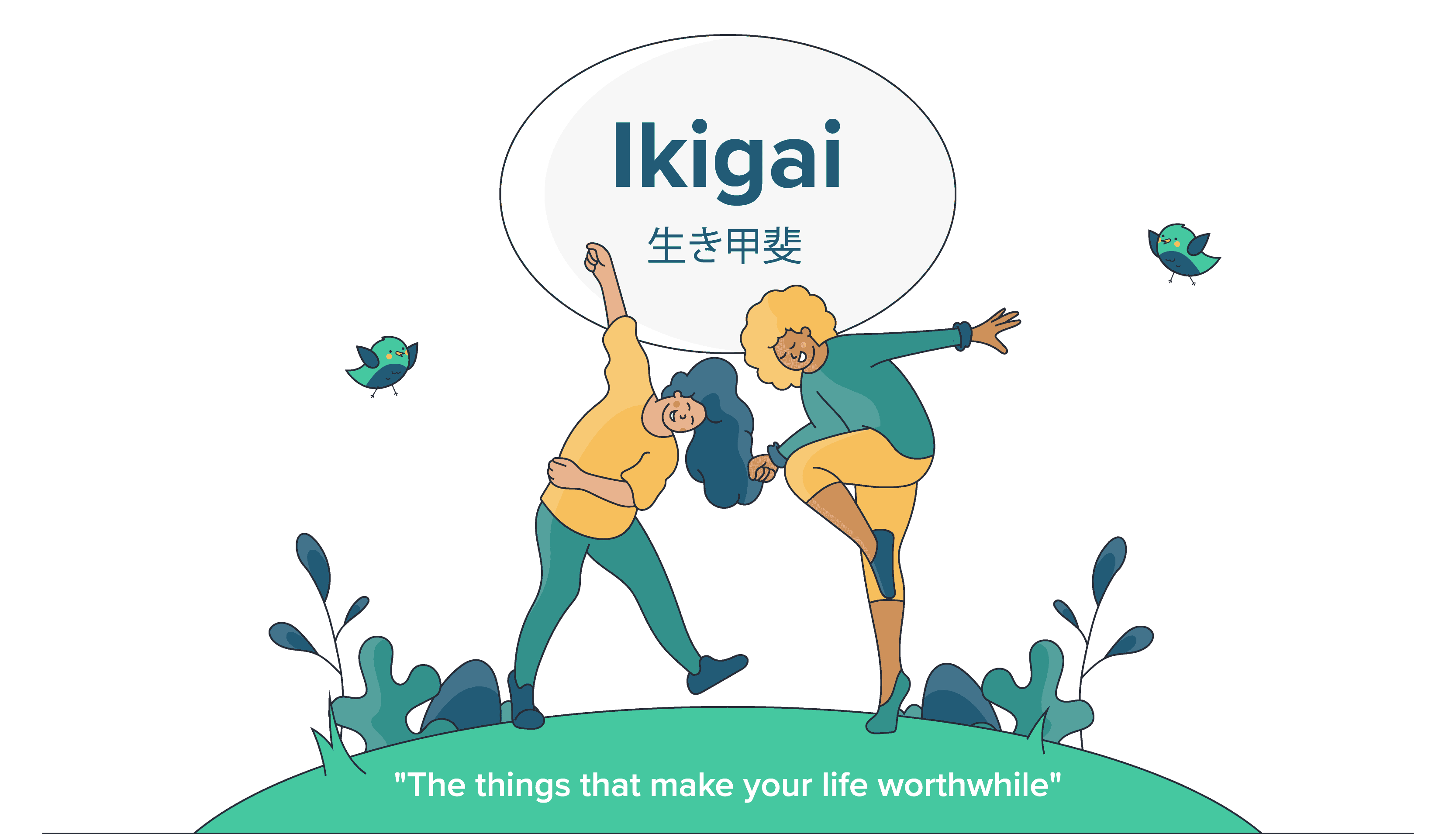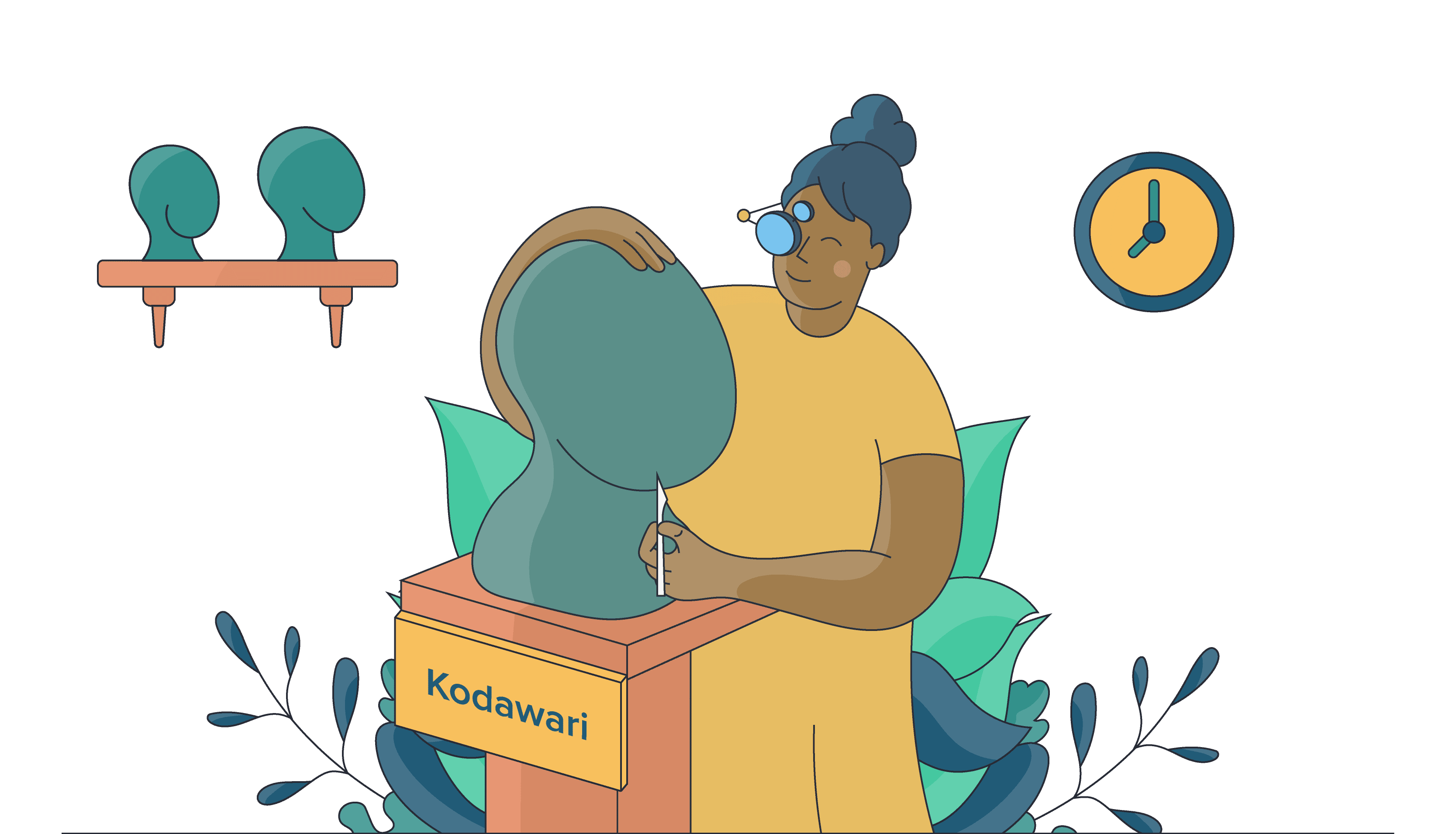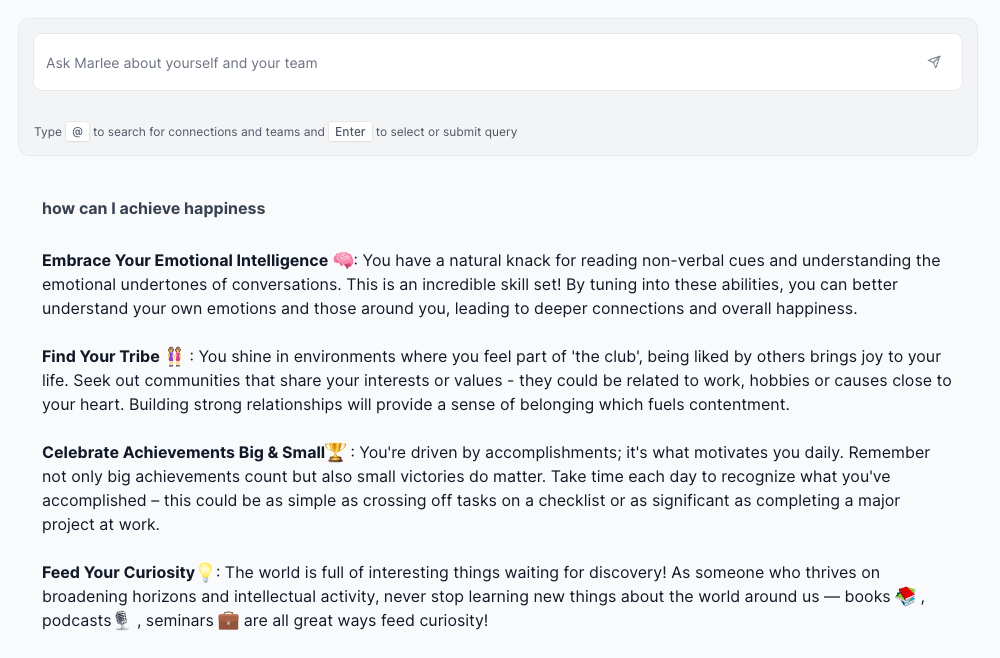🎯 Ikigai meaning: 5 Steps to unlocking your life's joy 🎯
Some people seem to possess an inner joy that helps them navigate life's challenges with a positive attitude. Their secret may lie in the Japanese concept of "ikigai," which offers a path to finding purpose and meaning in daily living. Ikigai provides a framework for self-discovery, allowing you to identify your passions, embrace a more fulfilling mindset, and cultivate lasting happiness. By exploring this philosophy, you can learn to appreciate life's simple pleasures and maintain motivation, even in difficult times. Join us as we delve into the essence of ikigai from the Japanese and Western perspectives and discover how it can guide you toward a more joyful existence.
What is ikigai and what does it mean?
Ikigai (生き甲斐, "ee-kee-guy") is a Japanese concept. It describes the things that make your life worthwhile and that give you a deep sense of purpose, satisfaction, and joy.
Ikigai is made up of two Japanese words, iki (生き), which means life, and kai (甲斐), meaning effect, result, value, benefit, or worth. Iki and kai come together to give us ikigai: a reason to live/to exist.
(If you're curious, the "k" turns into a "g" due to a linguistic phenomenon known as 'rendaku'. In Japanese, voiceless consonants (such as "k" in kai) become voiced (e.g., "g" in gai) when they appear in front of words that make up the second part of a compound.)
Although the concept of ikigai is well-known among Japanese people, Psychiatrist Mieko Kamiya first popularized it in her 1966 book Ikigai ni Tsuite - (生きがいについて - On the meaning of life).

The word has recently made its way into Western culture. It's sometimes defined as the 'secret to a happy life' or 'something that brings pleasure or fulfillment.' (This isn't entirely accurate, but we can clear that up later.)
What's the history of ikigai?
The origin of the word ikigai dates back to the Heian period (794 to 1185). Professor Akihiro Hasegawa has studied the concept of ikigai for many years.
He believes the 'kai' comes from the Japanese word for shell or shellfish (貝). During the Heian period, shells were valuable. They were often hand-decorated by artists and used as part of a shell-matching game called "kai-awase" (貝合わせ). Only the rich could afford these beautiful and valuable shells. This is how the word kai became synonymous with worth, value, and benefit.
The misconception of ikigai and your professional career in the west
Ikigai has risen in popularity over the past few years. Blogs and news outlets, such as the BBC have published countless stories such as Ikigai: The Japanese secret to a happy life. Unfortunately, many people in the West confuse ikigai with a certain Venn diagram about 'finding your purpose'.

This ikigai diagram comprises four overlapping circles. Each circle contains a question. And each set of circles comes together to describe one's passion, mission, professional career, and vocation. Once you've contemplated each question, you can reveal your ikigai / life purpose.
The four questions ask whether or not you're doing...
- Something that you love
- Something that the world needs
- Something you're good at
- Something you can be paid for
Entrepreneur Marc Winn popularized the diagram. He combined the ikigai concept with a purpose-finding process invented by Spanish astrologer Andrés Zuzunaga in 2011. It became popular and turned into a meme. Many English-speaking cultures reference it as the authoritative definition of ikigai. (Credit goes to Nicholas Kemp for chronicling the history of ikigai's misconceptions.
The purpose diagram can help people find balance in their lives, but its advice helps with finding an ideal career, rather than life advice. It has nothing to do with the Japanese concept of ikigai. The online ikigai diagram suggests that meeting all four conditions is necessary to achieve true happiness or ikigai.
That's not true, because it implies you can't experience ikigai if you do something you love but aren't getting paid for it. Your life passion might not be related to your professional career.
And while we're at it, let's clear up a certain geographical misconception.
Okinawan centenarians don't hold the secret to ikigai. Yes, life expectancy is surprisingly high in Okinawa (the southernmost prefecture of Japan) which is why it's on the list of Blue Zones.1 Authors Héctor García and Francesc Miralles interviewed a group of Okinawan citizens over the age of 100 to discover their life philosophies for their book Ikigai: The Japanese Secret to a Long and Happy Life. But it had the effect of placing Okinawa as the center of ikigai, which isn't correct.
Professor Hasegawa found that location doesn't influence people's ikigai. Rather, it has to do with a healthy life, intellectual activeness, and perceived social behavior/roles.
What's the true meaning of the Japanese word ikigai?
The truth is that Japanese people rarely ask themselves the above questions concerning ikigai. And it doesn't have to be related to our professional lives or business. The term isn't so grandiose in its original context. In reality, ikigai has more to do with the little things in life. Finding deep meaning in the small, happy moments, and learning to treasure them as they nourish you with joy. This sense of awareness and gratitude is what makes a meaningful life.
According to Professor Hasegawa, we can blame the language barrier for this misinterpretation. Ikigai has long been described as the Japanese secret to a long happy life. But it's not something we can measure – nor does it lie in a certain sweet spot. The word iki, which comes from the verb ikiru/to live (生きる) pertains to daily living. When talking about someone's lifetime in more general terms, the Japanese use the noun 人生 (jinsei) instead.
So, here's a better way of framing the English translation, coined by Nicholas Kemp - The value one finds in day-to-day living.
Japanese business and life consultant, Azumi Uchitani explains this distinction well in her video:
The things that really bring you meaning in life (ikigai)
Mieko Kamiya didn't just help popularize the term ikigai in Japan. Many researchers (including Professor Hasegawa) have used her findings to try and capture the true meaning of ikigai.
One thing Kamiya established was that most people have one specific force, or focus, of their personal ikigai. This can be tied to the past, present, or future and is related to personal life experiences. Some ikigai examples include:
- Experience
- Memory
- Health
- Hobby
- Family members
- Friends
- Social role
- Future events
- Imagination

Any of these can fuel a person's ikigai and personal development, leading to several positive feelings of life satisfaction:
- Self-realization and willingness to live
- Sense of fulfillment in everyday life
- Motivation to live
- Sense of existence
- Sense of control
These feelings are known as ikigai-kan. Many in the West are driven by similar motivational forces; we're just not always conscious of their effects. In Japanese culture, people tie their happiness and well-being to their ikigai. Finding purpose and staying strong even when dealing with a highly stressful daily life. Japanese people's ikigai may be linked to their endurance, discipline, and determination.
What are some examples of ikigai?
With that in mind, here are some ikigai examples, to bring this to life.
Think of the single mom who's working two jobs to make sure her children have everything they need. Life's not easy, but taking care of her children, watching them grow, and putting a smile on their faces is enough to keep her going. Her children are her ikigai, bringing her a strong sense of joy and fulfillment in an otherwise exhausting and challenging life.
Think of a young student's will to study hard and pursue their dream job and a teacher's quest to see their students flourish. A grandma's ikigai might be living a healthy life or seeing her children or grandchildren every week.
Yes, your professional career might be closely linked to your ikigai. But note how there's not necessarily a correlation with monetary benefits. This is what the Venn diagram gets wrong. As we've already mentioned, small things that bring pleasure and a sense of fulfillment in life make just as much of a contribution to your ikigai.
How to find your ikigai: 5 steps
Ikigai isn't an elaborate secret or fancy technique that can give meaning and purpose to life. It's not something you can find. At least, according to neuroscientist Ken Mogi. For Mogi, it makes more sense to do away with strict definitions, focusing on the positive impact of ikigai – and finding a way to replicate its effects.
Anything that gives you joy while also fueling you forward can be described as ikigai.
Ken Mogi identifies five principles that can help people feel more grateful as they learn to appreciate the small joys of life.

1. Start small
The first pillar of ikigai is closely tied to the Japanese philosophy of kodawari (こだわり – 'commitment'). You can think of kodawari as the relentless pursuit of perfection in one's work or craft. Many Japanese know perfection is unattainable, but they aim to be efficient and innovative.
Even if they have access to limited resources, Japanese followers of ikigai will put their heart and soul into what they do. Always looking for new ways to improve and progress. They know that greatness doesn't come easy, and they don't mind moving forward one step at a time.
Diligence, patience, and attention to detail allow them to see beauty in the smallest things. Things such as the first sip of coffee in the morning, a child's laughter, and the strong scent of tonkotsu ramen in the streets of Tokyo.

2. Release yourself
According to Mogi, The second pillar of ikigai is accepting yourself as you are. Variation is one of the greatest hallmarks of nature. He believes there's happiness to be found in allowing your true self to flourish and shine through.
He mentions the Japanese proverb junin toiro (十人十色), which translates to 'ten different colors for ten different people.' And lies at the core of ikigai philosophy:
"In pursuing your ikigai, you can be yourself, as much as you like. It is only natural that you should be yourself because each one of us has a slightly different color."
Although otherwise a collectivist culture, the Japanese value variations in personality, sensitivity, and expression.
3. Live in harmony and sustainably
The third pillar is all about harmony and sustainability. You should pursue your own dreams and desires. But you should always take the sustainability of your social – and natural – environment into consideration as well.
You see, ikigai is a kind of motivational force that helps you move forward: it gives you the strength to do the chores when you'd rather sleep. It pushes you forward on your ideal career path (while finding joy in it) when you could stay complacent at your current job. But more importantly, ikigai is about being in harmony with the environment, with the people around you, and with society at large.
For Westerners, the concept of harmony can be a tricky one. We often find ourselves in competitive environments where hierarchies and power structures dominate. It's difficult to see the bigger picture when we're so preoccupied with our individual worries and desires. We don't often see how we fit into that bigger picture, and that can bring us down.
4. Find joy in the small things
Despite what most Westerners believe about ikigai, for most Japanese people, it has nothing to do with their full-time job. Due to demanding and uninspiring work environments, a key ingredient of ikigai is seeking fulfillment outside of work. Japan is a country of hobbyists who've taken the joy of small things to a whole new level.
What if you work in business full-time but have a passion for pottery? You find time to spend in your workshop, even if you only sell one $10 vase by the end of the week. The sense of achievement and satisfaction you feel by landing that sale might be enough to fuel your ikigai for days to come. Or it could just come from the creative process of making it, rather than the commercial aspect.
As an example, Mogi talks about the huge number of people who actively produce and sell their own manga at the komiketto (コミケット – comic market). Sure, it can be lucrative to some extent, but for the vast percentage of people it's a joyful hobby.
5. Be in the here and now
Being present is a frame of mind. You'll be familiar with this concept if you've studied Eastern philosophies before. Remaining focused on the here and now allows you to lead a calmer, more carefree life. Mogi believes this final pillar is all about bringing out our inner child. And taking the time to cherish and appreciate every fleeting moment.
He says that children are always filled with joy because they don't spend too much time thinking about the past or the future. The present moment brings new adventures and sensations that they just need to explore.
Being more childlike can be life-changing. We can continue to learn, play, and be free and creative without worrying too much about our daily routine, financial stability, social roles, or status.
Tools to help you live a more fulfilling life
If you're feeling a little lost in identifying your personal ikigai, answering our questions on what motivates you is a great place to start. Our evidence-based questions can help you identify your personal motivational traits and gain insights from our AI Coach, Marlee. Insights will help you understand what you enjoy, versus what drains your energy, to improve your well-being. You can then Ask Marlee any question such as 'how can I achieve happiness?' and instantly receive personalized insights based on your motivations, to support your human development journey.

You can set a personal goal and Marlee will recommend an online coaching program to help you achieve it. Our Vital Wellbeing program is a great one to improve your overall emotional health, vitality, and self-esteem. Marlee will help to keep you on track with twice-weekly AI coaching at a time that suits you
Ikigai in a nutshell
Ikigai is finding joy and bliss in life and wholeheartedly dedicating yourself to your personal happiness. It's all about discovering the small joys that make life worth living for you.
It doesn't have to be a big secret that will suddenly enlighten you and give you purpose.
Take some time to observe the world around you. Be kind, look inward, and try to make the most of every moment without overthinking things. That's the key to a happier life.
And remember, finding your ikigai is a never-ending process and a way of being. Enjoy the journey, wherever your life path takes you.
Discover your Ikigai and find meaning
Explore our questions on what drives you to uncover your motivational strengths and growth areas. In just 15-20 minutes, gain insights into what fuels your passion and purpose in both life and career.
Recommended program for you:
Our expert coaches developed a 9-week Vital Wellbeing program to help you learn how to calm anxiety quickly and build emotional resistence.
Coach Marlee (your amazing AI-powered personal coach) will analyse your unique traits and goals to personalize the program so you see results as quickly as possible.
Testimonials

“This coaching program has really helped me to see the value in goals, and get much better at setting them. It’s had a really positive impact on my career!”

“As an engineer, I never thought about doing a retro with my family. This has been cool.”

“The Team Building program was a great tool to get to know my team and to explore how can we improve our way of working”

“I learned how to set, move to take action and progress towards happiness”

“I have always found it hard to ‘slow’ down but this helped me to see how I can slow down to speed up”

“Blew my mind, had no idea how arrogant I have been. Total blind spot. I really like the multiplier stuff”

“I learned how to chunk up and see the bigger picture before turning to the details”

"With attention to detail program, I learned a whole new way to see and approach projects"
Frequently asked questions
What does ikigai mean?
Ikigai (生き甲斐, "ee-kee-guy") is a Japanese concept meaning "a reason for being". It describes the things that make your life worthwhile and that give you a deep sense of purpose, satisfaction, and joy. Ikigai is made up of two Japanese words, iki (生き), which means life, and kai (甲斐), meaning effect, result, value, benefit, or worth. Iki and kai come together to give us ikigai: a reason to live/to exist.
What does ikigai mean in Japanese?
Ikigai is related to two Japanese words:
iki (生き), which means life kai (甲斐), meaning effect, result, value, benefit, or worth.
Iki and kai come together to give us ikigai: a reason to live or to exist.
How to find your ikigai?
Finding your ikigai can bring meaning to life. Here are 5 principles to help you discover your ikigai:
- Embrace the Japanese philosophy of kodawari and put your heart into what you do by constantly striving for improvement.
- Accept yourself as you are, understanding that everyone has their unique color, just like the Japanese proverb junin toiro suggests.
- Pursue your dreams while considering the sustainability of your environment and the people around you.
- Find joy in life with the small things. Ikigai doesn't have to relate to your career; it's about finding fulfillment in hobbies and small pleasures.
- Embrace the present moment, cherish the small joys, and bring out your inner child to lead a more carefree and creative life.
Discover your ikigai by following these principles and finding joy in the journey of life.
- (2017). Available at: https://www.bluezones.com/2017/05/okinawa-diet-eating-living-100/#:~:text=Okinawa%20is%20one%20of%20the,expectancy%20rates%20in%20the%20world.
Related Articles
What’s your communication style?
Learn how to connect with colleagues and boost workplace motivation.

Name Surname
Position, Company name

Name Surname
Position, Company name

Name Surname
Position, Company name

Name Surname
Position, Company name

Name Surname
Position, Company name

Name Surname
Position, Company name
Your submission has been received!

Hack your wellbeing, productivity and goals
Programs are created by expert coaches & delivered by our incredible A.I. Coach Marlee. Sessions only take 5-15 minutes and are 100% personalized to fit your unique traits and goals.
